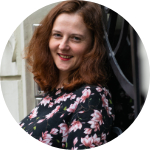Author: Natalia Otrishchenko | 03.09.2024

Photo: Kyiv, December 2013 (c) Natalia Otrishchenko
How are we as academics and citizens involved in radical events shaping and impacting our future? How can we engage professionally when the borders between different roles become blurred? My colleagues and I from the Center for Urban History in Lviv had to ponder these issues in 2013 during the protests in many cities around Ukraine against the decision to suspend the signing the Association Agreement with the EU. We were sitting in the kitchen and talking about the events in Kyiv when the authorities violently dispersed the peaceful rally. Many organisations at that time went on strike to show their opposition, and due to the sense of urgency and commitment, we decided to join this strike in our way. Together with Anna Chebotariova, we coordinated the ‘Voices of Resistance and Hope: Kyiv-Lviv-Kharkiv’ project, which aimed to bring together the diverse personal stories, emotions, and expectations of the participants of the protest events.
We conducted the first wave of interviews in Kyiv (as the main events happened there), Lviv, and Kharkiv to gather perspectives from different regions in the first half of December 2013. In addition, there were five conversations with Euromaidan activists in Warsaw and Lublin. The second wave took place during the first half of February 2014 after confrontations on the streets of Kyiv became violent. We selected interviewees among the protest participants according to the quota principle (quotas for age and gender) and approached activists and organizers via personal contacts. Together with colleagues from different institutions and students from Ivan Franko Lviv National University, we collected around 145 in-depth interviews.
Our method of sampling did not seek to represent the views of all of the protesters but intended rather to show the range of opinions and motivations of participants of the Euromaidan in a particular city at a specific time. For example, in the second wave, most people interviewed in Kyiv were middle-aged men. This social group was the largest among the people who lived permanently in the tents and buildings around the Independence Square (according to the survey conducted on 3 February 2014 by the Ilko Kucheriv Democratic Initiatives Foundation and the Kyiv International Institute of Sociology, 88% of respondents were males and the mean age of the protesters was 37).
We archived the recordings and transcripts in the Urban Media Archive of the Center for Urban History. Since we collected these materials under extraordinary circumstances, as well as taking into account the security challenges associated with the Russian occupation of Crimea and the beginning of Russia’s hybrid war in the Donetsk and Luhansk regions, we could not publish this collection in the same way as our other oral history projects. We understood that some participants may since have joined the army or be living under Russian occupation and did not want to endanger them by disclosing personal and sensitive information. Therefore, we launched an open call for scholars interested in working with interviews and preparing them for publication. In 2019, Hana Josticova, a researcher in the field of social mobilisation, joined us at the Center as a visiting scholar and organised the anonymised materials from the interviews into 17 thematic categories. For instance, there is a category that combines people’s reflections on their identities, another on expectations of possible European integration and European values, and another on motivations to join the protest actions.
After the full-scale Russian invasion, we returned to the experience of the Euromaidan to better understand the experience of self-organisation, resilience, and the subjectivity of Ukrainian society. We also recognised the need to reexamine how the region’s history is told and, thus, aimed to provide researchers and educators with sources to analyse the protest. With a grant from the Lysiak-Rudnytskyi Ukrainian Studies Support Program, we translated these materials – around 700 pages – into English. Now, they are available after registration for anyone interested: https://uma.lvivcenter.org/en/collections/146/interviews. The story of this collection, which was created in 2013–14, published in an online archive in 2019, and translated in 2023, also exemplifies the importance of having the institutional durability to work with materials collected during an emergency. It also brings us back to the researchers’ responsibility during moments of rupture — our actions must combine sensitivity to challenges in the present (e.g. the safety of our interviewees) and thinking about the future (e.g. creating sources that can help others better understand the dynamics of change).
Author
 Natalia Otrishchenko is a sociologist and research fellow at the Center for Urban History in Lviv, Ukraine. She holds a PhD in sociological methodology from the Institute of Sociology, the National Academy of Sciences of Ukraine (2015). From 2019 to 2022, she was an associate researcher at the Center for Contemporary History in Potsdam, Germany. During the 2022–23 academic year, she was a Fulbright Visiting Scholar at the Department of Sociology, Columbia University, USA. Since March 2022, she has led the Ukrainian team of the ‘24/02/22, 5 am’ documentation initiative. Her research interests include qualitative methods, oral history, urban sociology, and the sociology of expertise.
Natalia Otrishchenko is a sociologist and research fellow at the Center for Urban History in Lviv, Ukraine. She holds a PhD in sociological methodology from the Institute of Sociology, the National Academy of Sciences of Ukraine (2015). From 2019 to 2022, she was an associate researcher at the Center for Contemporary History in Potsdam, Germany. During the 2022–23 academic year, she was a Fulbright Visiting Scholar at the Department of Sociology, Columbia University, USA. Since March 2022, she has led the Ukrainian team of the ‘24/02/22, 5 am’ documentation initiative. Her research interests include qualitative methods, oral history, urban sociology, and the sociology of expertise.
Citation: Otrishchenko, Natalia, Sources from Inside the Protest: The Euromaidan Interview Collection, KonKoop DataLab Blog, published online: 03/09/2024, https://konkoop.de/index.php/blog/sources-from-inside-the-protest-the-euromaidan-interview-collection/
